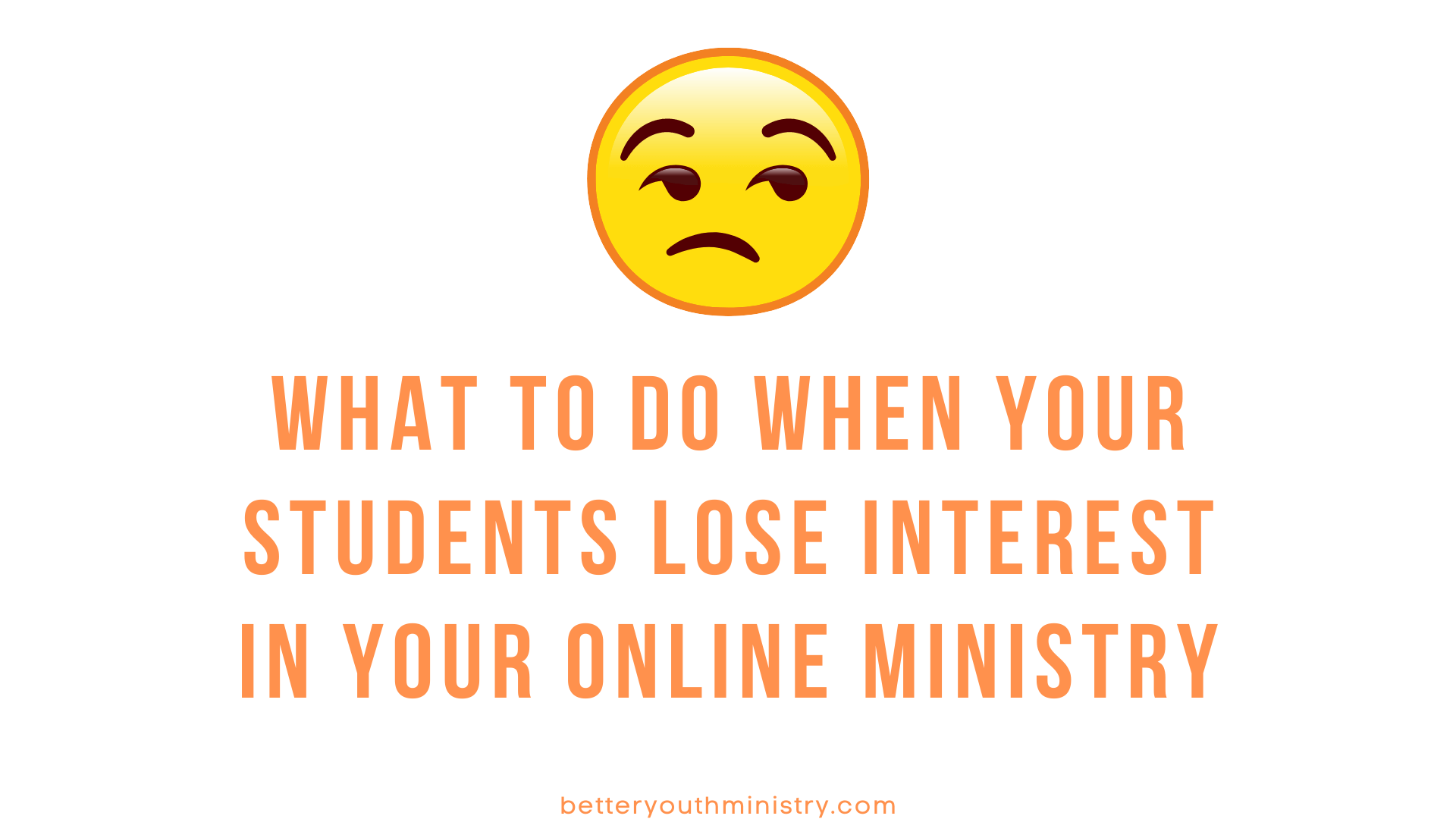You started with such excitement. We all did.
There was a sense of adventure about taking your ministry online, right?
And students showed up, tuned in, and participated… for a few weeks. There were even some kids who probably jumped in that you hadn’t seen in months before then.
But now, well… there’s only so many Zoom scavenger hunts you can do. And who would’ve guessed that terms like “social distancing” and “Zoom fatigue” would become part of our regular vocabulary over the last several months?
But here we are.
In my conversations with youth pastors, I’m hearing from more and more of them that they’re tired. They’re starting to get frustrated.
Three weeks of virtual, online ministry was cool. But twelve weeks… not so cool.
And I’ve heard so many variations of the same question that I figured it was time to write down a few thoughts. The question basically goes like this: “My students have pretty much checked out. Many of them have stopped showing up to our online meetings. They aren’t watching our Wednesday Night Live broadcasts. And some of them haven’t replied to our group text in three weeks. What can I do now?”
I would focus on one (or more) of these six things:
1. Celebrate the students who do show up.
This is true when you’re meeting in-person too, but it’s worth remembering in the digital space. Some kids aren’t showing up because they’re seriously spent. They’re overworked and overwhelmed, and getting online again to see what you’re doing just isn’t very appealing to them.
Others aren’t showing up because they really don’t care. For them, the substance of their faith is being revealed for what it truly is: non-existent.
But it’s hard to distinguish between who’s who… so don’t try. Instead, focus on supporting and celebrating the students who are engaging and participating with what you’re doing. Keep pouring into them and helping them grow.
2. Create more varieties of shorter content.
Don’t limit your online ministry presence to a basic reproduction of what you would’ve done in-person. The online space is different. Attention spans are shorter. Instead of 15 minutes of worship and a 20-minute message, break it up.
Maybe do a song, then part of your message. Then a song and another part of your message. Or, space them out and do one song and one part of your message spread across three consecutive days (Tuesday, Wednesday, and Thursday).
Also, you can do some personal stuff, like do a student show-and-tell with stuff around their house that is special to them. I’ve seen different ministries doing short baking shows in someone’s kitchen or dance videos in a person’s living room. These are all short, fun, and engaging online.
Another must-do is to include the students in as much as you can. Ask them to read a Bible verse and share a devotional thought for the day. Ask them to say something about their favorite worship song and why it’s meaningful for them right now. Students will usually tune in for other students, so work with that.
3. Communicate with parents.
This time is just as taxing for many parents as it for students. They’ve been thrown into a new world too, working from home and dealing with daily squabbles around the house.
As a parent, it’s easy to assume that my middle school son knows what he’s supposed to be doing, but – honestly – he sometimes doesn’t even know what day it is!
When I get an email from the youth pastor about what’s coming up this week in the ministry and the various ways for my kids to connect with it, I’m more likely to make sure my son gets on and doesn’t miss out. That’s the power of communicating and partnering with parents.
4. Embrace analog experiences.
This is helpful for kids who are simply done with the digital side of things. Write encouragement notes and send them in the mail. Make goody boxes and drop them off (safely, of course). Make yard signs and deliver them to students’ houses to let them know you’re thinking about them.
When we experience digital overload, going back to analog ways can be a really great move.
5. Slow down and plan for the future.
This situation won’t last forever, and it has certainly provided a rare opportunity to rethink and re-evaluate your strategy for the future. How will you relaunch your ministry after all of this over?
What have you learned from this experience? What needs to change going forward? What will you continue doing? What will you stop doing? How will you reach students and help them grow in a post-Covid-19 world?
These are all important questions and your answers to them will only be as good as the time you spend thinking about them. If students have become disengaged, don’t fight against it. It is what it is. Slow down, and start planning for the future.
6. Train up your small group leaders.
This season has been a real test of whether or not your students really feel connected to their small groups. It’s often those relationships – with other students and the group leaders – that keep students coming back week after week.
These next few weeks are a great time to really pour into your leaders. Cast new vision for the importance of their role, their groups, and their investment as leaders. Challenge them and train them to go deeper when things resume.
Your Move
We’re all feeling it. The early excitement and sense of adventure have gone away. That’s true for youth pastors, volunteers, and students alike. But there are still some things you can do to make the most of this time.
• Celebrate the students who show up.
• Create more varieties of shorter content.
• Communicate with parents.
• Embrace analog experiences.
• Plan for the future.
• Train up your group leaders.
Pick one or two of these ideas, and see what happens. And remember: Every week matters… especially right now.
Suggested Resource
Latest posts by Trevor Hamaker (see all)
- 7 Ways to Deal with Disruptive Students - December 18, 2024
- Fighting Frustration by Shifting Your Focus - December 18, 2024
- What is the Most Important Job of a Small Group Leader? - December 18, 2024
Did You Like This Post?
Sign up to get updates sent to your inbox each week!
You're in! Want more ideas and support for your ministry? Check out the BYM Community!
http://bit.ly/bymcommunity


